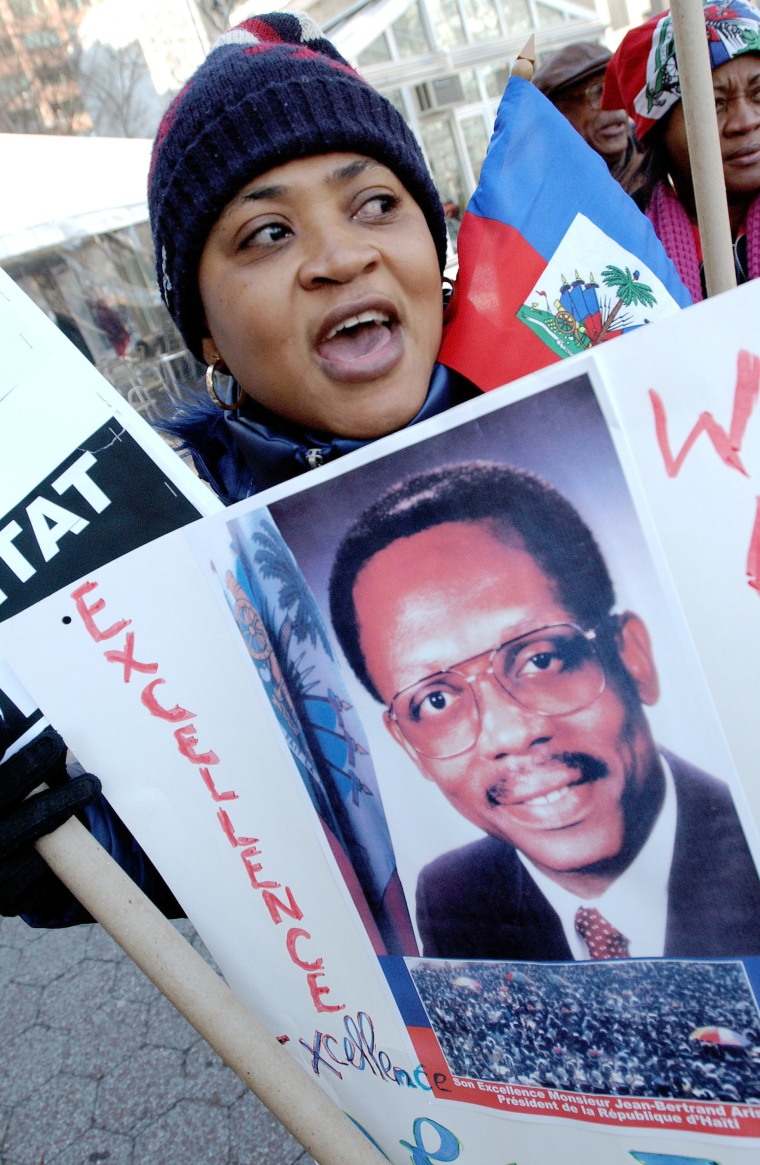Their country rocked by another deadly crisis, Haitians across the United States are fearful about what new chapter has begun in their homeland's troubled history.
Around New York City's Flatbush neighborhood, the fast-flowing crisis, which has put the presidency of Jean-Bertrand Aristide in peril, is the greatest preoccupation.
Already, dozens of Haitians have died since rebels launched their attacks on Feb. 5 — and worry about problems at home are written in the faces of Haitians who live in the Brooklyn enclave.
At the Immacultee Bakery on Nostrand Avenue, a small group of Haitians passionately discussed the crisis over coffee as schoolchildren and locals came in and out of the shop.
Dominique Charles, in his 60s and a U.S. resident for more than 30 years, explained his fears this week. “I just got a call from my daughter in Haiti this morning. She asked me, ‘What’s happening, Daddy?’ They suffer, and I suffer too. I would give food, I would give money, but I can do nothing.”
The view from the shops
The Haitian community in New York City is one of the largest in the country. The 2000 census estimated the city's Haitian population to be about 118,000 people, but many believe the population to be closer to 300,000.
They dominate the Flatbush area, where the Haitian presence is signaled with shops like the Fritaille d’Haiti, which sells Haitian fast food like fried plantains, rice and sauce, and the Philomena Religious Supplies shop, which offers colorful religious statuary, incense, candles and even cleaning supplies like Run Devil Run, a bath and floor wash.
“We need the violence to be stopped,” said Mary Pierre, a nurse at the Menorah Home and Hospital nursing home who has lived in this country for 19 years. With her mother, a brother and a sister back home, Pierre is constantly buying phone cards to stay in touch.
Strong opinions
“All we are asking the Bush government to do is respect our Haitian government and let Aristide finish his five-year term,” said Joseph Cadet, a middle-aged man who has lived here for 20 years.
Like many Haitians in New York, Cadet has family and friends in the country as well as investments through a barbershop, a discothèque, and a carwash. He is very concerned about the instability at home and is a strong supporter of the Aristide government. Cadet believes that the rebels trying to oust Aristide right now are little more than terrorists.
“Bush says he is against terrorists. But these are terrorists right in Haiti. This is a terrorist organization, they are not rebels,” Cadet said.
Poll taps divergent views
In a recent poll conducted among Haitian Americans, 52 percent said they believe that Aristide should stay in office.
The survey was conducted by Bendixen and Associates polling agency and covered a representative sample of Haitian American adults in Florida, New York, New Jersey, Connecticut and Massachusetts.
The respondents were interviewed in English, French or Creole. Out of those polled, 35 percent respondents said that Aristide should resign.
However, the responses reflected a sharp generational and linguistic gap. Respondents under the age of 30 and who responded in English were less supportive of Aristide — 46 percent felt that Aristide should resign, while 39 percent said he should serve out his term.
That stood in contrast to respondents above age 50, with only a quarter saying Aristide should resign, while 64 percent believed that he should serve out his term.
'Aristide is the best'
The pro-Aristide view was evident at the Immacultee Bakery, where banners hung on the wall celebrating the recent 200-year anniversary of Haiti’s independence.
“Aristide is the best. He built 157 new schools. He built good roads. He built a hospital,” said Roger Joseph, who was a teacher in Haiti.
Meanwhile, down the street at the Philomena Religious Supplies shop, 34-year-old Randaph Rack held a different opinion. “If he [Aristide] cannot help the country, he should leave.”
Rack added, “It’s a bunch of crazy people fighting, and no one can control it…. We need help."
Staying on top of the news
In addition to acquiring $5 phone cards to call home, Haitians depend heavily on their own media to learn about events at home.
The Haitian Times, a weekly newspaper with the slogan “Bridging the Gap,” works to play a key role in the Haitian-American community. “First and foremost, the goal of the paper is to inform readers of what’s going on,” explained Garry Pierre-Pierre, the publisher and founder of the paper.

“This is exactly the moment the Haitian Times was created for: to provide a balanced view of what’s going on for Haitian and non-Haitian readers,” Pierre-Pierre said.
Pierre-Pierre, a former reporter for The New York Times in Haiti during the crisis of the 1990s, explained how during that period he saw a real need for an objective publication to help make sense of the complex issues there for Haitians and non-Haitians alike. The paper boasts a weekly circulation of approximately 15,000 and is published in English, with one page in French and a column in Creole.
Radio Soleil d’Haiti, a radio station broadcasting mostly in French and Creole, is another lively source of information.
The programing is normally a mix of news, call-in show and music, but now it's mostly news, said Ricot Dupuy, the station manager, who operates out of a small store on Nostrand Avenue.
On Wednesday night, the station broadcast live with breaking news from Haiti.
Dupuy explained the goal of the radio station,:“To help empower the Haitian community here. To give them a forum. An electronic meeting place…. To extol their joy and feel their pain. We provide a community service.”
With large posters celebrating "200 Years of History" and glossy pictures of Aristide on the walls, the station's allegiances in the current conflict are clear.
Dupuy explained the editorial viewpoint of the station. “We are against the overthrow of the current government. We are for negotiation. In no way can we support the forced ejection of an elected official. “
A call for fairness
Judging from the lively call-in shows, Dupuy explained that most of his listeners feel that “the United States should be a fairer arbiter in the dispute.”
“There is a general feeling that the opposition has the total support of the U.S. government," he said. "It is clear that the U.S. believes Aristide is responsible [for the current problems] and that emboldens the opposition."
Dupuy added that while the situation in Haiti is extremely complex, there is a belief that the “U.S. has the strength, legitimacy, and respect to come up with a solution that is fair.”
Meanwhile, back at the Fritaille d’Haiti, an elderly Haitian woman who declined to give her name, commented simply “les problems, les problems” when asked about her homeland.
She was resigned to the continuing crisis in her country, but reaching to show a visitor the Jehovah’s Witness religious literature in her bag, she said she still prayed for Haiti. Her daughter, and the owner of the shop, explained that’s all they can do.
